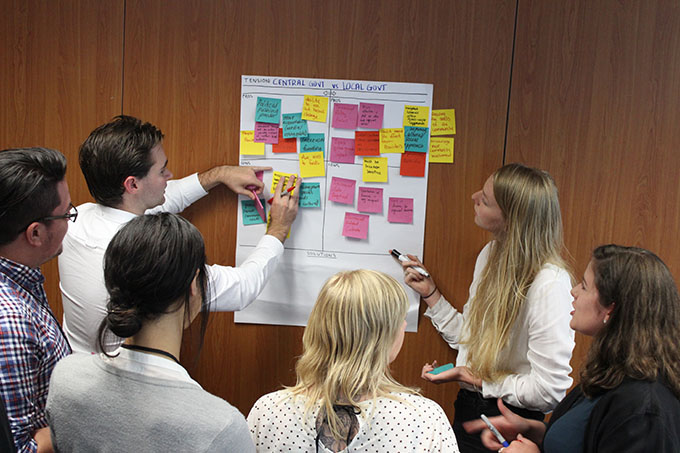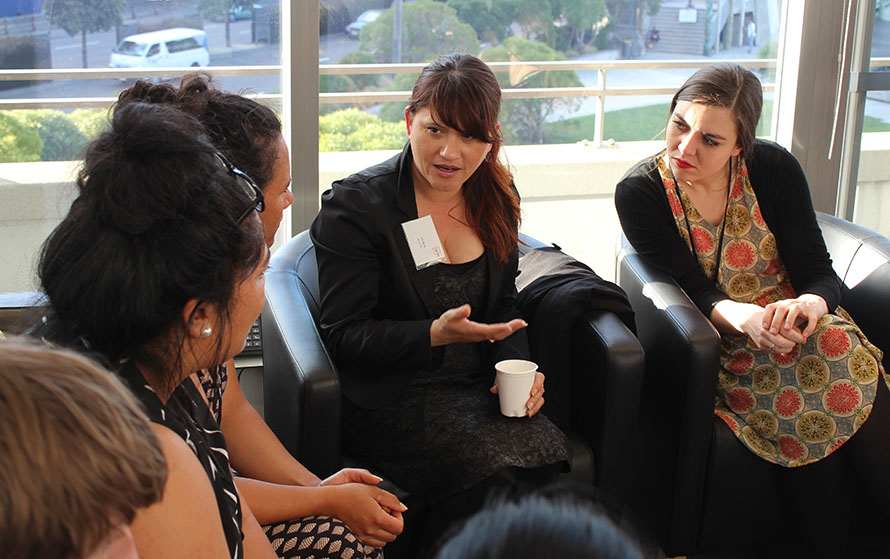The first day of the TacklingPovertyNZ workshop was a very busy one, with numerous speakers sharing their knowledge and expertise with the participants and broadening the range of perspectives and ideas in the room. Please note that videos of the day’s sessions will be made available early in 2016. Learn more about this workshop at the TacklingPovertyNZ website.
Session one: Welcome
The first session at Treasury with staff-members Anne-Marie Brook and Kristie Carter saw the participants settle into the room that would be their space for the entirety of the workshop. Anne-Marie and Kristie introduced the idea of tensions and trade-offs in policy making, and urged the group to keep that in mind throughout the day in anticipation of the interactive session that they would be leading in the afternoon.
Session two: A Practical Perspective
The second session provided ‘A Practical Perspective’ and gave participants an understanding of the multi-faceted ways that poverty detrimentally impacts people’s lives. This session was driven by a panel who set the scene and described the current state of affairs in New Zealand from a wide range of disciplines and real-life perspectives.
Firstly the group heard from Dame Diane Robertson, CEO of the Auckland City Mission. Diane discussed the overwhelming experience that a typical family of four engaging with social services might have in a usual week. Expanding on the research seen in the Mission’s Family 100 Research Project, Robertson explained how growing debt is a continuous pressure on poor families and noted that ‘the only people who are nice to [my] clients are the finance companies.’ She recounted other key experiences from the Family 100 Research Project, explaining that one of her case study clients spent 60% of her week in search of food to feed her family. Diane noted in the reflection session that there is not one single solution to poverty – all solutions are context-dependent and must be focused on the actual needs of those experiencing poverty, not just the ideas of the policy advisors.
Following Diane was David Rutherford, Chief Human Rights Commissioner. David gave the group an international rights-based perspective on the idea of poverty and reinforced the idea first introduced by Diane that poverty policy solutions must be based on experience.
Craig Smith, a criminal barrister and solicitor from Porirua, shared his experience of working in the youth justice sector since 1986. Craig has lectured Police officers undergoing Youth Aid Officer training at the New Zealand Police College as well as mentoring young Criminal lawyers. He emphasised the importance of anchoring solutions to poverty in local communities, and supporting the natural networks that already exist in these contexts.
Chris Theobald, Principal of Holy Family School in Cannons Creek, Porirua, continued on this theme. He discussed the racial inequities that contribute to social exclusion and poverty in his area, and touched on New Zealand’s history of scarcity caused by colonialism. He explained that there are families at his school whose members are the hardest working people he has seen, dispelling the myth that people experience poverty because they do not work hard enough. Chris reiterated that the biggest obstacles for those in his community are ‘debt, racism, and powerlessness’. He encouraged participants to focus on equity (the output) throughout the workshop, as opposed to equality (the input).

Suzanne Snively in discussion with participants
Suzanne Snively, who initially came to New Zealand as a Fulbright scholar of economics and who now works for Transparency International, drew on her comparative experience in the United States and in New Zealand. She explained that when she originally came to New Zealand we were ranked internationally amongst the most equal societies, but that there is now a high level of inequality in our society. She placed an emphasis on the need to support families in order to grow healthy, happy children, and she proposed extending paid parental leave as an example of a way to achieve this. Suzanne noted that unpaid work in the home is not appreciated in New Zealand and said that we must change this mindset if we want our society to be composed of resilient families.
You can see the Powerpoint presentation from this session here.
After hearing from all of the speakers, participants brainstormed around the ideas that appealed to them most from the session and then presented these solutions to the wider group.
Session three: An Economic Perspective
After a break for lunch with the speakers, the group welcomed the third session’s speakers who would present ‘An Economic Perspective’. Firstly, Dr Eric Crampton of The New Zealand Initiative gave a brief overview of economic solutions to the policy issues that are woven into the poverty problem. He mentioned the need to use clever data to drive creative solutions to this problem, such as that of Statistics New Zealand’s Integrated Data Infrastructure. He also discussed housing policy as an example of where policy interventions can drastically improve the lives of those in poverty.

From left to right: Max Rashbrooke, Dr Ganesh Nana, Geoff Lewis, Dr Eric Crampton and Awerangi Tamihere
Next, Geoff Lewis from the New Zealand Productivity Commission continued the thread begun by Dame Diane Robertson in the morning, focusing on the social services sector and how these agencies can better provide for the needs of families. He discussed the Productivity Commission’s More Effective Social Services report which highlights the fragmentation of social services in New Zealand. Geoff argued that there should be a dedicated budget for social services that can be used in non-prescriptive ways according to the needs of specific communities.
Dr Ganesh Nana, Chief Economist at BERL, drew the conversation into focus by directly discussing the issues that arise when we try to discuss poverty. He said that New Zealand is still at the stage where differing definitions of poverty are being quibbled about and we need to move beyond this into a ‘grown up’ discussion. Ganesh talked through several issues, ranging from Treasury’s Living Standards Framework to his belief that there is no trade-off between economic growth and poverty reduction. Ganesh’s take-home message was that we need to stop being apologetic when discussing poverty and be honest when we do not know the answers.
Max Rashbrooke, editor of Inequality: A New Zealand Crisis (June 2013) and the author of The Inequality Debate: An Introduction (March 2014), spoke from his experience as a researcher and journalist about his ideas on how to tackle poverty. He discussed lack of income as a major factor contributing to poverty, and put forward some practical ideas about how to tackle it. He suggested that boosting wages, benefits, wealth, health and mobility of finances would all be important steps to take in tackling poverty. Max noted that societies with the most generous welfare systems are the ones who see people move faster off government benefits and into employment.
Following Max was Awerangi Tamihere of Te Whānau O Waipareira, who supported the views of previous speakers and who stated that family-centric approaches are needed when devising policy to alleviate and prevent poverty. She discussed the need for community agility in order to support the outcomes of social service clients.
Session four: A Focus on Tensions and Tradeoffs
Treasury staff members Anne-Marie and Kristie returned to run a great session illustrating how to determine tensions and trade-offs when developing policy. The energetic interactive session made for an excellent end to the group’s first full day at Treasury.

Participants explore the tensions and trade-offs between central government and local government
Session five: Informal dinner with MPs and Treasury team
To finish off the day, the group walked along the waterfront to the the McGuinness Institute offices, where they shared dinner and conversation with MPs from a range of political parties. Participants were seated according to their groups, and each group grilled MPs over dinner and dessert. The MPs in attendance were Ria Bond (NZ First), Marama Fox (Māori Party), Hon. Paul Goldsmith (National) and Hon. Nanaia Mahuta (Labour). This was an incredibly valuable session, and one we would like to include in future workshops.
After a challenging and information-heavy day, the participants headed back to their accommodation to prepare for Day 2.

Hon. Paul Goldsmith with participants

Marama Fox with participants

Ria Bond with participants

Hon. Nanaia Mahuta with participants




